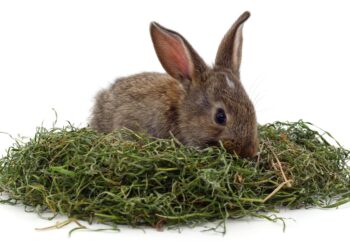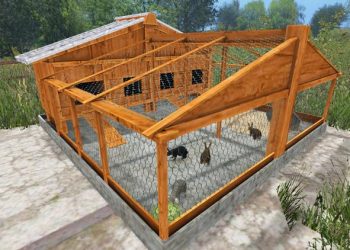Rabbits can be infected with a worm infection at a young age. The infection can take place in the nest, through the mother rabbit. This is often not noticed because the worms are in the cecum droppings. These droppings are eaten by the rabbit again.
Complaints that can occur with a worm infection are diarrhea, disturbed growth in young rabbits, an unsightly coat, little appetite, and abnormal droppings due to stagnant intestines. The vet will prescribe medication to cure the infection.
How Do Rabbits Get Infected With A Worm Infection?
Rabbits can be infected by several types of worms. These are located in different places in the gastrointestinal tract. Usually, the worms are in the appendix and are only visible on the soft droppings that result from it.
Reading Suggestions: Why Rabbit Vaccinations Important?
The pinworm (Passaluris Ambiguous) is the most common worm. This worm lays eggs around the anus and can sometimes be seen on the stool (small, white strands). The worms are no longer visible in dried stools.
A rabbit can be infected
- Through its mother, the infestation is already taking place in the nest.
- By another infected rabbit.
- Through unwashed green forage or fresh grass.
- If he/she eats the eggs of the worm, which are in the cecum droppings.
The digestive system of a rabbit
The digestion of a rabbit mainly takes place at the end of the gastrointestinal tract. In the large intestine and the appendix.
The fermentation of the food takes place in the appendix. That means that food undergoes a change with the help of the good bacteria present. Fermentation is necessary for the digestion of the food, nutrients are released.
Why Do Rabbits Eat Appendix Droppings?
Nutrients released during fermentation are not absorbed by the body, because then the intestine has already passed. Nutrients are obtained from food in the gut. The rabbit poops out these cecum droppings, also called caecotrophs.
Immediately afterward, the rabbit eats them again. During the second digestion, important nutrients are absorbed by the body. Appendix droppings look different from regular droppings. They are soft, small, shiny, slimy, and shaped like a bunch of grapes.
Reinfection By Eating Cecum Droppings
In an infected rabbit, the worms are in the appendix. They sometimes come out with appendix droppings. The rabbit eats these droppings and reinfects itself. This is often not noticed because the droppings are eaten immediately. The worms are not visible in the normal, hard droppings.
A quiet gut
A rabbit with a worm infection often suffers from a silent bowel. A silent gut no longer digests food. The rabbit has no droppings or abnormal droppings. The rabbit stops eating, is lethargic, and shows signs of pain such as grinding teeth.
If you have signs of a silent bowel, it is important to see a vet immediately. Within a day a life-threatening situation arises. The intestines need to get back to work as soon as possible.
Common Complaints In Young Rabbits Are
- Diarrhea
- Disrupted growth
- Sudden death due to an intestinal blockage or another infection that has the chance to strike when resistance is reduced.
Common Complaints In Older Rabbits Are
- Ugly fur, bad shedding
- Occasional bloated stomach and silent bowels causing the rabbit to produce abnormal droppings.
Abnormal Droppings
- No or too little droppings – Worms affect bowel function so that the rabbit regularly has a quiet bowel. During these periods, the rabbit eats little or no food and produces little or no droppings.
- 1.5 times oversized droppings – In between, the rabbit has normal to 1.5 times larger egg-shaped droppings. These are the normal droppings.
- Slime threads – Sometimes there are slime threads in the droppings.
- Appendix droppings with a different shape – The appendix droppings are shapeless, mushy, and have worms in them. (normally these are a number of small, stuck together in the shape of a bunch)
The treatment
The vet performs a microscopic examination of the cecum droppings and can use this to determine whether the rabbit has an intestinal infection. If so, treatment can be started. If there are no cecum droppings, but the rabbit does show the symptoms of an infection, the rabbit can still be treated.
The infection is treated with a course of treatment. This course lasts at least fourteen days, a short course usually does not help. Because this worm species is common, monitoring, especially in young rabbits, is useful.
Preventing a worm infection
A worm infestation can be prevented with good hygiene. Rabbits usually do their business in a permanent place in the hutch. It doesn’t take much time and effort to keep this place clean. Remove droppings and wet spots from the coop every day.
This is a source of bacteria. Once a week, thoroughly clean the entire hutch and clean it with warm water. The food bowl and drinking bottle must also be clean. Provide fresh water and feed every day. Keep insects out of the coop with an insect screen or fine mesh.
Rabbits like a handful of freshly picked grass, but don’t pick it where wild rabbits eat. Good nutrition and sufficient exercise increase the rabbit’s resistance. In addition, it is important to take care of a congener. A satisfied rabbit with good resistance has less chance of diseases.
Have a vet check the rabbit after treatment to see if the worms are gone. The vet can also vaccinate the rabbit against worms.










